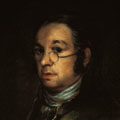








(TITIAN)
CHARLES LAMB
Hogarth excepted, can we produce any one painter within the last fifty years, or since the humour of exhibiting began, that has treated a story imaginatively? By this we mean, upon whom has subject so acted that it has seemed to direct him—not to be arranged by him? Any upon whom its leading or collateral points have impressed themselves so tyrannically, that he dared not treat it otherwise, lest he should falsify a revelation? Any that has imparted to his compositions, not merely so much truth as is enough to convey a story with clearness, but that individualizing property, which should keep the subject so treated distinct in feature from every other subject, however similar, and to common apprehensions almost identical; so as that we might say this and this part could have found an appropriate place in no other picture in the world but this? Is there anything in modern art—we will not demand that it should be equal—but in any way analogous to what Titian has effected, in that wonderful bringing together of two times in theAriadne, in the National Gallery? Precipitous, with his reeling Satyr rout about him, repeopling and re-illuming suddenly the waste places, drunk with a new fury beyond the grape, Bacchus, born in fire, fire-like flings himself at the Cretan. This is the time present. With this telling of the story an artist, and no ordinary one, might remain richly proud. Guido in his harmonious version of it, saw no farther. But from the depths of the imaginative spirit Titian has recalled past time, and laid it contributory with the present to one simultaneous effect. With the desert all ringing with the mad symbols of his followers, made lucid with the presence and new offers of a god,—as if unconscious of Bacchus, or but idly casting her eyes as upon some unconcerning pageant—her soul undistracted from Theseus—Ariadne is still pacing the solitary shore, in as much heart-silence, and in almost the same local solitude, with which she awoke at daybreak to catch the forlorn last glances of the sail that bore away the Athenian.
Here are two points miraculously co-uniting; fierce society, with the feeling of solitude still absolute; noon-day revelations, with the accidents of the dull grey dawn unquenched and lingering; the presentBacchus with the past Ariadne; two stories, with double Time; separate, and harmonizing. Had the artist made the woman one shade less indifferent to the God; still more, had she expressed a rapture at his advent, where would have been the story of the mighty desolation of the heart previous? merged in the insipid accident of a flattering offer met with a welcome acceptance. The broken heart for Theseus was not lightly to be pieced up by a God.
Lamb's Complete Works, edited by R.H. Shepherd (London, 1875).

Bacchus and Ariadne.
Titian.